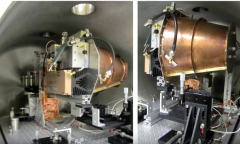By KM Diaz, | April 28, 2017

DARPA research wants to give the brain at least 30 percent boost to learn new skills faster than the usual. (YouTube)
DARPA announced on Wednesday that they want to enhance the human cognitive ability by activating the so-called "synaptic plasticity."
The synaptic plasticity is the ability of the synapses to be weak or strong by responding to increase or decrease activity as time goes by. It is an important part of neurochemical foundations for memory and learning.
Like Us on Facebook
DARPA's theory is that, people can be smarter if the brain will be re-wired. The study suggests that stimulating the peripheral nerves - signals between spinal cord, brain, and other parts of the body - can enhance the ability of a person to learn faster by activating the production of neurochemicals that regulate the brain's connections.
DARPA funded eight different research team that aims to improve the learning ability and targets the nerves through electrical stimulation. The goal of their Targeted Neuroplasticity Training (TNT) program is to instantly apply the findings into the real world to boost the military regimen such as allowing the soldiers to learn new language within a month, rather than years.
Doug Weber, the manager of the program, says that they want to deliver new knowledge towards the neural processes to regulate cognitive functions linked to learning. The work of DARPA involves basic biology to create neurostimulation devices that could utilize biological wiring to improve learning.
Johns Hopkins University which is a DARPA-funded team will focus on hearing and speech. The researchers will study the vagal nerve stimulation to recognize if it can accelerate learning a new language.
Another DARPA-funded team is the University of Florida; the research team will examine how vagal nerve stimulation influences the executive function, perception, spatial navigation, and decision-making in rodents.
Meanwhile, the Arizona State University will focus on stimulating the trigeminal nerve to know how it affects the sensory, visual, and motor functions of military volunteers studying reconnaissance, intelligence, surveillance, decision-making, and marksmanship.
DARPA program wants to settle the debate on how the products sold in the market that suggests psychological, physical, and cognitive performance enhancement works. They will conduct a test to analyze the effectiveness of both non-invasive and implanted devices to understand how the products became useful.
Weber also explains that if they were able to distinguish the link between improvements in learning and neurostimulation, they will advance to the second phase of the program which is developing a device that trains people to enhance foreign language, image analysis, learning, and spatial navigation tasks. Moreover, DARPA research wants to create a group of cognitively enhanced super soldiers, and to give the brain at least 30 percent boost to learn new skills faster than the usual.
Currently, the agency has other brain projects that use implanted chips for the treatment of mental illness and to restore the movements and memories of wounded soldiers from the battle.
-
Use of Coronavirus Pandemic Drones Raises Privacy Concerns: Drones Spread Fear, Local Officials Say

-
Coronavirus Hampers The Delivery Of Lockheed Martin F-35 Stealth Fighters For 2020

-
Instagram Speeds Up Plans to Add Account Memorialization Feature Due to COVID-19 Deaths

-
NASA: Perseverance Plans to Bring 'Mars Rock' to Earth in 2031

-
600 Dead And 3,000 In The Hospital as Iranians Believed Drinking High-Concentrations of Alcohol Can Cure The Coronavirus

-
600 Dead And 3,000 In The Hospital as Iranians Believed Drinking High-Concentrations of Alcohol Can Cure The Coronavirus

-
COVID-19: Doctors, Nurses Use Virtual Reality to Learn New Skills in Treating Coronavirus Patients











